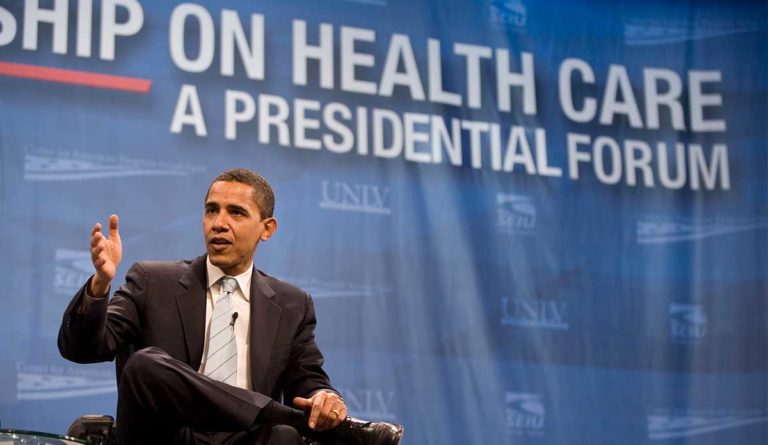Jonathan Cohn: Covering Health Reform
Jonathan Cohn talks with editor-in-chief, David Jones, about lessons learned during his career reporting on health policy and predictions for the future.

Read Time: 10 minutes
Published:
Jonathan Cohn writes about politics and policy with a focus on social welfare. He is the author of Sick: The Untold Story of America’s Health Care Crisis—and the People Who Pay the Price. He previously worked at the New Republic and American Prospect, and has written for the Atlantic, New York Times Magazine, and Self. His journalism has won awards from the Sidney Hillman Foundation, the Association of Health Care Journalists, World Hunger Year, and the National Women’s Political Caucus.
Jonathan Cohn talks with Public Health Post editor-in-chief David Jones about lessons learned during his career reporting on health policy and predictions for the future.
DKJ: So, tell me a little about your background, how you got into journalism and specifically how you landed a health policy beat?
JC: It was pretty clear early on that I love journalism. I went off to college and I took pre-med classes, but I was more interested in politics – which is what I majored in. Of course, my true major turned out to be the school newspaper.
When I got out of college, I really couldn’t find any newspaper jobs, but I did find a job at the American Prospect. I got to edit articles. I say working there for a couple years was really my graduate school. And then I ended up at the New Republic. I was editing at first but I liked to write on the side. I was looking for something to cover that no one else was covering. In 1997, no one wanted to go near healthcare. Everybody was so burnt out from the Clinton experience.
I wrote about health care for a long time when it seemed like really absolutely nobody cared. But you know what they say, if you spend enough time on something, it’ll eventually be interesting. By 2000 it had become apparent to me reading some of this stuff that the problems that were there are still here. We’re going to keep talking about them, and we’ll probably have another big debate about it. That led me to write my book.
By sheer coincidence, my book came out in 2007 right when the Democratic presidential campaign was kicking in. I appear on the scene as a knowledgeable healthcare person right at a time when everyone is interested in it.
Now as you look back with hindsight over how the past seven years have worked out, what are your reflections on what it was like in covering the passage of the ACA from 2007 to 2010?
I’ve actually spent a lot of time thinking of that. I was always proud of, and still am, of the work that policy journalists did during that debate. There was really meaty stuff to the coverage. I think most people were trying to do a different kind of journalism. Most of us, I think, were conscious of what the 1993-94 debates had been like, and since so much of it was formed by policy distortion. We were really trying something else to get away from that.
So, thinking through what we all thought the Affordable Care Act would look like when it was implemented, my sense coming out of it was: there was an ideal of what it was going to look like and it went through compromise, compromise, special interest, politics, and what came out on the other end was, like Tom Harkin said, a starter home. It would accomplish a lot and it would have a lot of drawbacks.
Looking back, I remember when the first round of stories of rate shock came out. Some people were going to end up paying more right under the new rules, and there was a sense that no one said anything about that. And you know, we wrote about that, but it’s funny, that did not get a lot of attention at the time. That was not one of the topics that really got litigated. And I think there were a lot of reasons for that. One was that we were all arguing about other stuff. And I think another reason was for someone like me, I spent a lot of time before then writing about the problems of the non-group market. I certainly had in my head a vision of a non-group market that was so dysfunctional, which it was, except there were people with coverage who didn’t get sick or they were one of the few who did have a good policy and so they were pretty happy. You don’t appreciate until it happens is that even if it is not that many people in the grand scheme of things, if it is a million people, people are going to get pretty upset. And I think we missed that story.
But then again, in the grand scheme of things, in terms of distortion of the political debate, I’ve seen much worse, even in the healthcare debate. I think right now, the way that both plans are being presented is orders of magnitude more distorted. By in large, the ACA looked like what it was promised to be.
Having seen this played out twice, there was so much work that went into crafting an Affordable Care Act before Obama even took office.
I’ve written recently that this right now feels more like 1993 than it does 2009 in that there’s consensus that they want to do something but not real consensus on what it is they want to do, whether the politics will line up with that. What do you expect this Congress to do?
So, this is going to sound funny but I said the exact same thing about it. Having seen this played out twice, there was so much work that went into crafting an Affordable Care Act before Obama even took office. You can even make the argument that if you really want to trace the history of this, you’ve really got to go back to the late 90s. There were a good five or eight years of foundation meetings and review articles. All that stuff that seems kind of pointless at the time, but it was about working out ideas and coming to a consensus.
By 2008, Edwards comes out with his plan and then eventually Obama and Clinton do theirs over the course of a year. And they’re all the same model, except for the mandate, everyone is kind of thinking the same. There was a real sense in the beginning that there could be Republican buy-in. And, in addition, Democrats had gone through this exercise once in 1993 and failed. Badly. I mean those scars were still there. Ted Kennedy was determined to not to let that happen again. Henry Waxman understood what had happened last time. Nancy Pelosi moved the chess pieces so that the chairs of the three committees were all her people. So, all that work, and it still took them another year and a half or a year.
Republicans are not close to there yet, conceptually. It feels more like 1993. Also, everyone who studies this stuff understands that it is hard to find a consensus. There’s always going to be losers, someone who will pay the cost and a political price. So, you got to be willing to do that, you really have want to do it. Democrats have been trying to this for 75 years or more. This was something that they really, really felt passionately about.
Republicans, the ones that understand this plan, and there aren’t that many, they got to know that at the end of the day, the big winners are the people whose taxes go way down, which is predominantly the top 3% of the income scale, people who are in relatively good health and young, or relatively affluent, who will certainly be happy. Look, there are lot of trade-offs to the ACA, and there will certainly be people who are getting worse insurance now and will get better insurance as a result, but there will be a lot of people who are going to lose health insurance and a lot of people will end up paying more.
As sympathetic as someone who paid more under the ACA [was] it’s a whole lot worse to face a news story when it’s a cancer patient or the parent of someone with a congenital heart condition. More of those people in more dire circumstances. So, the potential blowback will be really hard and I just wonder, has this dawned on more and more Republicans because I don’t think a lot of them know this yet. I don’t think they understand this yet, not that they’re not thinking about this. They’re really going to want to see this through, take a year of their time, lose the political opportunity cost. I question whether they have that will.
…there are lot of trade-offs to the ACA, and there will certainly be people who are getting worse insurance now and will get better insurance as a result, but there will be a lot of people who are going to lose health insurance and a lot of people will end up paying more.
Another tricky dilemma here is what the Democrats do and how they deal with it. What are you hearing right now on Capitol Hill about how Democrats are thinking about those trade-offs and their dilemma?
I am surprised at the extent to which Democrats decided to immediately take a really hard line on this and basically, we’re not going to even negotiate unless you’re talking about something that keeps coverage roughly where it is. They’ve held that line successfully to my surprise. I would have predicted you would have had Democrats defecting.
The politics of this are changing so quickly. I think if you’ve asked me a week or two afterwards, I would say if Democrats were lucky, Republicans will decide to straighten out that they want bipartisan buy-in, and there would be some deal where a large repeal but some of the mechanisms stay in place and states that expanded Medicaid maybe get the chance to keep some of the people on the roll.
But I think there are chances of a very different outcome. The window of possibilities has moved substantially now. There is a very real possibility Republicans come out of this with nothing. I think Democrats are in no rush to help a party that offered them no help. I think they feel like they have the upper hand, they’re the ones who are standing by, keeping coverage for people.
And it’s funny to me, that the most unusual situation in politics is a win-win for both parties. The Republicans would get to claim victory, which is important. They would be true to their principle of state sovereignty, giving states more flexibility. States that really felt that strongly about it, you know, can go ahead and change things more. At the same time, some people will lose coverage which if you’re a Democrat you really are unhappy about. On the other hand, it kind of ends the Obamacare wars as we know them.
Feature image: Center for American Progress Action Fund, Barack Obama at Las Vegas Presidential Forum, used under CC BY Attribution-NoDerivs 2.0/cropped from original




